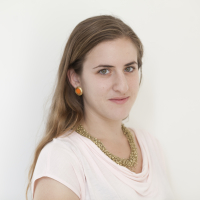I had the opportunity to hear him teach only once. About six weeks ago, I drove down with some friends to Tekoa, a settlement that will realistically never be annexed to Israel. It was a cold Sunday night, but inside the small synagogue-cum-classroom it was warm. The lecture was set to begin at nine—it started at ten thirty. It was someone’s birthday, so homemade chocolate cake was passed around—in the big pans you see only in religious collectives. And of course, I knew at least a few people there by face, all genuinely happy. They were glad because Rav Froman was still alive. Because they knew that his teachings from the Zohar would be accompanied by music and hand clapping. Because they were thankful for his passion—his happy, eccentric, crazy-in-a-Breslov-kind-of-way style. Because his mode of spirituality spoke to them. And because they believed he held the keys to a different kind of peace. A religious one.
Yesterday, Rabbi Menachem Chai Shalom Froman left this world. Two days before he passed, he gave an interview to Walla! in which he was—as always—deeply honest. He admitted to fearing death at certain moments. He asked his wife to sing his favorite song (also sung at his funeral). He cried. And then he asked for more time. And if you would have asked him why, I bet he would have answered that, as marginal as he was politically, he was just beginning to make real headway in his quest to bring a new kind of religious Zionist to Israel, one who believed in peace, could respect Islam, and trusted Palestinians. He just wanted more time.

And that’s what most people focus on when they write and talk about Rav Menachem Froman—his vision for peace in the Middle East channeled through a spiritual connection that maybe Bibi and Abu Mazen didn’t exactly get. That’s why Froman talked to “the enemy”—to Yassir Arafat—to whom he quoted both the Talmud and the Hadith; to former Hamas leader, Sheikh Ahmed Yassin, who told him that, were it left up to them, they could make peace in hamsa dakika (five minutes); and to Mahmoud Zahar, the current head of Hamas—who, unlike Yassin whom he succeeded, is still alive and able to talk. When asked in an interview some years ago, “What do you recommend Western culture do [when it comes to the conflict]?" Froman said, and then repeated one thing: “To respect Islam.”
But to me what is perhaps more interesting about Rav Froman is less his peace strategy (which he, in his own way, took very seriously), and much more the segment of Israeli society drawn to him.
Yesterday I went back to Tekoa for his funeral. Which lasted, yes, four and a half hours. Yesh Atid MK, Ruth Calderon, taught Talmud and Professor Yehuda Liebes taught Zohar. Ehud Banai and Beri Saharof played at his graveside. His children wept openly.
And most attendees did, too. Adults, most of them young, listening to the eulogies (most, fittingly, in a playground outside the over-packed synagogue), and cried. And that’s the thing: the funeral was powerful for everyone present. It was a moment of excruciating loss for the sliver of the religious Zionist community stirred by Rav Menachem Froman’s religious sensibility and harmony politics. Alongside the founders of Gush Emunim who attended his funeral (of whom he was, no doubt, a part), were all those who see themselves “post” in one way or another—maybe “post-Zionist” or “post-halakha” (in the Hasidic sense), or even just “postmodern.”
I have a close friend who grew up in the settlement of Talmon, an ideological little spot in Samaria, and went to an all-girls high school in the equally ideological and equally Samarian Ofra. She told me that, for her, this was the draw of Rav Froman. She used to go to his weekly lectures in Tekoa. “He spoke a different language,” she told me. “We didn’t always understand what he said—he would sometimes put the Tefillin on the other arm. And that was what got me.” For her, it was about his willingness to break down the known constricting frameworks of religion, of settler culture, and—in her words—to “speak truth.” For her he presented the hope that this culture could be something else. He was of that world—he went through the system (Yeshivat Merkaz HaRav, Yeshivat Hakotel, Ateret Kohanim, Machon Meir—you name it), yet he was not precisely of that world. Yes, the ingredients were there: The Land of Israel, the People of Israel, the Torah of Israel, and the State of Israel. But he broke their static order.
Rav Froman endorsed Obama for president and, on Election Day, he went to pray for his victory at the Cave of the Patriarchs in Hebron. A symbolic act that summarized his interesting, complex, and, yes, privileged politics. He deeply believed that Islam is a religion of peace, and he was outspoken about his desire to obtain citizenship in a future Palestinian state. Yet all of the elements of his philosophy were manifest in Tekoa, a settlement surrounded by Palestinian villages that, however you cut it, is still an obstacle to a two-state solution and on unequal footing in countless ways with the very neighbors to whom Froman was so friendly.
There was a great deal about Rav Froman that was sensational, in every sense of the word. He would often kiss the earth of Israel; at night, he would say the shema prayer for hours. He was often prone to joke about all things—religious and otherwise. But that’s what my friend found so compelling about him. Rav Froman was important because he broke the rules.






